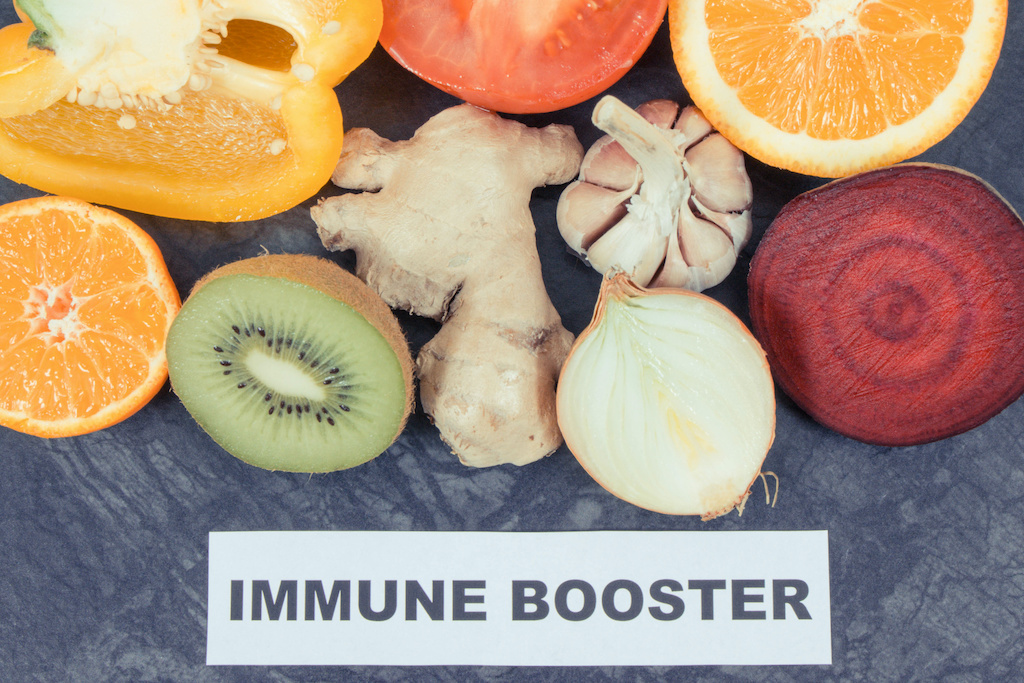Boosting Immunity with Nutrition: Best Dietary Strategies

A strong immune system is essential for protecting the body against infections and illnesses. Nutrition plays a critical role in supporting and enhancing immune function. Here are the best dietary strategies to boost your immunity naturally.
Essential Nutrients for Immune Health
Vitamin C:
- Vitamin C is a powerful antioxidant that helps protect cells from damage and supports the production and function of white blood cells.
- Sources: Citrus fruits (oranges, lemons, grapefruits), strawberries, bell peppers, broccoli, and spinach.
Vitamin D:
- Vitamin D is important for immune function and can enhance the pathogen-fighting effects of monocytes and macrophages.
- Sources: Fatty fish (salmon, mackerel), fortified dairy products, egg yolks, and sunlight exposure.
Zinc:
- Zinc is crucial for the normal development and function of immune cells and can help reduce the duration of the common cold.
- Sources: Meat, shellfish, legumes (beans, lentils), seeds, nuts, and dairy products.
Probiotics:
- Probiotics are beneficial bacteria that support gut health, which is closely linked to immune function.
- Sources: Yogurt, kefir, sauerkraut, kimchi, miso, and other fermented foods.

Dietary Strategies for Immune Support
Balanced Diet:
- A well-balanced diet that includes a variety of fruits, vegetables, lean proteins, whole grains, and healthy fats ensures the intake of essential nutrients needed for immune function.
Hydration:
- Staying hydrated is important for overall health and helps the body function optimally, including the immune system.
- Aim to drink at least eight glasses of water a day, and more if you are physically active or live in a hot climate.
Antioxidant-Rich Foods:
- Antioxidants help protect the body from oxidative stress and free radicals, which can weaken the immune system.
- Sources: Berries, nuts, seeds, dark chocolate, and green tea.
Limit Processed Foods:
- Processed foods often contain high levels of sugar, salt, and unhealthy fats, which can negatively impact immune function.
- Focus on whole, minimally processed foods to support overall health and immunity.
Healthy Fats:
- Healthy fats, such as omega-3 fatty acids, have anti-inflammatory properties that can help support immune function.
- Sources: Fatty fish (salmon, mackerel), flaxseeds, chia seeds, walnuts, and olive oil.
Lifestyle Factors
Regular Exercise:
- Regular physical activity can boost immune function by promoting good circulation, which allows immune cells to move through the body more efficiently.
- Aim for at least 30 minutes of moderate exercise most days of the week.
Adequate Sleep:
- Sleep is crucial for immune function. During sleep, the body releases cytokines, proteins that help fight infections and inflammation.
- Aim for 7-9 hours of quality sleep per night.
Stress Management:
- Chronic stress can suppress the immune system and increase the risk of illness. Practices such as meditation, deep breathing, and yoga can help manage stress levels.
Conclusion
Boosting your immunity through nutrition involves incorporating a variety of nutrient-rich foods into your diet, staying hydrated, and making healthy lifestyle choices. By focusing on these strategies, you can support your immune system and improve your overall health. Remember, a balanced diet and healthy habits are key to maintaining a strong and resilient immune system.
Summary:
- Essential nutrients for immune health include vitamin C, vitamin D, zinc, and probiotics, found in various fruits, vegetables, lean proteins, and fermented foods.
- A balanced diet, proper hydration, antioxidant-rich foods, and limiting processed foods support overall health and enhance immune function.
- Regular exercise, adequate sleep, and stress management are crucial lifestyle factors that contribute to a robust immune system.

This article reviewed by Dr. Jim Liu, MD and Ms. Deb Dooley, APRN.
There’s nothing more important than our good health – that’s our principal capital asset.
#medical #telehealth #umedoc










